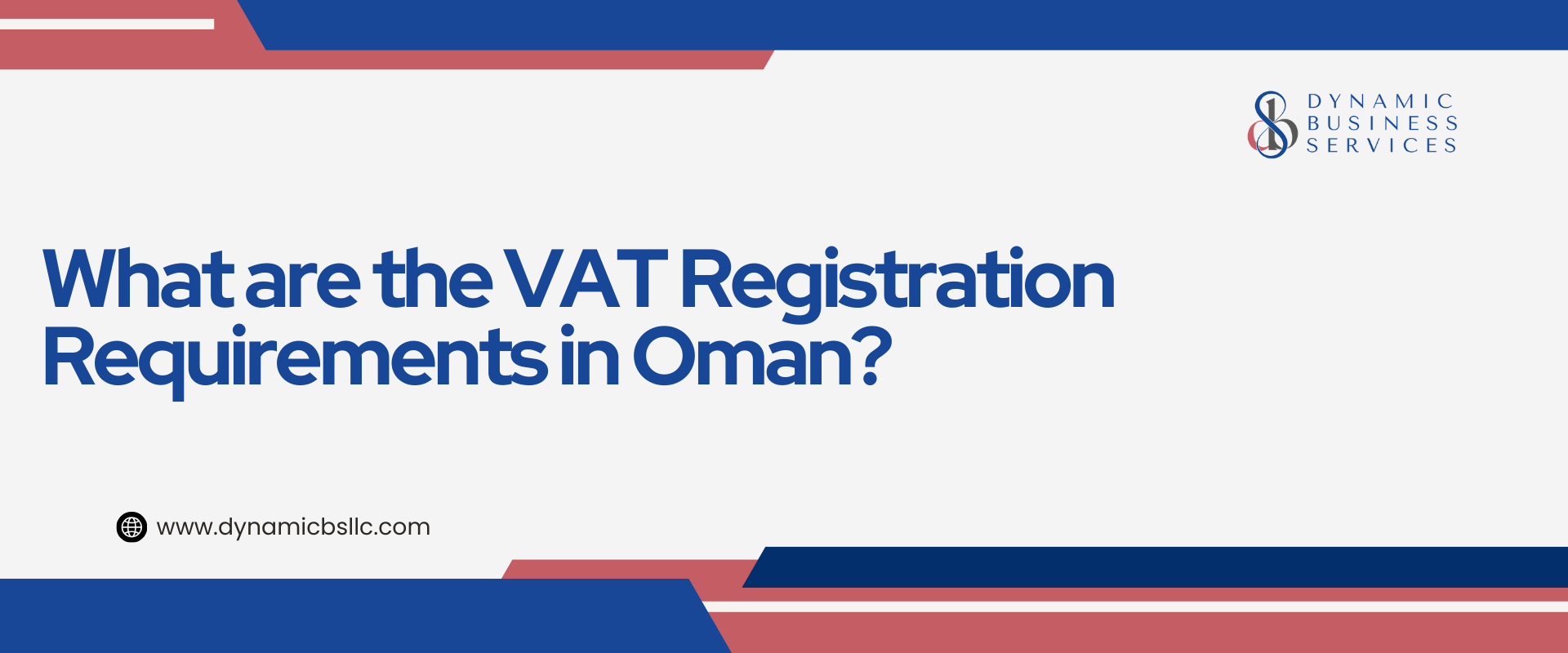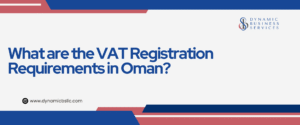The introduction of Value Added Tax (VAT) in Oman has transformed the country’s tax landscape. Implemented on April 16, 2021, VAT is now a crucial part of business compliance for companies operating in the Sultanate. Understanding the VAT registration requirement in Oman is essential for businesses of all sizes, whether they are local enterprises or foreign investors expanding into the Omani market. This guide provides a comprehensive breakdown of registration thresholds, eligibility requirements, compliance steps, and documentation, ensuring you understand exactly what is required to remain compliant with Oman’s tax regulations.
Table of Contents
Understanding VAT in Oman
The VAT system in Oman is based on international best practices, providing the government with a sustainable revenue source while aligning with the Gulf Cooperation Council (GCC) Unified VAT Agreement. VAT is applied to most goods and services at a standard rate of 5%, with specific exemptions and zero-rated supplies. For businesses, VAT compliance involves collecting tax on taxable supplies, filing returns, and remitting payments to the Oman Tax Authority (OTA).
Why VAT Was Introduced in Oman
The government introduced VAT to diversify revenue sources away from oil dependency. With growing public expenditure and economic reforms under Oman Vision 2040, VAT ensures a steady income stream for infrastructure, healthcare, and education. It also aligns Oman with other GCC states, such as the UAE, Saudi Arabia, and Bahrain, which have already implemented VAT. For businesses, this shift requires enhanced accounting practices and tax management systems.
VAT Registration Thresholds in Oman
One of the most critical elements of VAT compliance is determining whether your business meets the VAT registration threshold. Oman’s law specifies mandatory and voluntary registration based on annual taxable turnover.
Mandatory VAT Registration Threshold
Businesses in Oman must register for VAT if their annual taxable turnover exceeds OMR 38,500 (approximately USD 100,000). This includes sales of goods, services, and imports subject to VAT. Once this threshold is reached, registration with the Oman Tax Authority becomes compulsory, and failure to comply can lead to penalties and restrictions.
Voluntary VAT Registration Threshold
Businesses with annual taxable supplies and expenses above OMR 19,250 (about USD 50,000) but below the mandatory threshold can opt for voluntary registration. Voluntary registration is particularly useful for startups and small businesses that want to claim input VAT on their purchases and establish credibility with suppliers and partners.
Special Considerations for Non-Residents
Non-resident businesses supplying taxable goods or services in Oman must register for VAT regardless of their turnover. This ensures that foreign entities contribute to Oman’s tax system when operating within its borders. Typically, such businesses appoint a local tax representative to manage compliance.
Who Needs to Register for VAT in Oman?
VAT registration is not limited to large corporations; it applies to a wide range of businesses and professionals.
Companies and Corporations
All companies operating in Oman, whether limited liability companies, joint-stock companies, or foreign branches, must register for VAT if their taxable turnover exceeds the threshold. This ensures fair tax compliance across different business structures.
Small and Medium Enterprises (SMEs)
SMEs that meet the voluntary or mandatory threshold must also comply. Many SMEs benefit from voluntary registration to claim input VAT and maintain smooth supply chain operations. This step is critical in building investor and customer trust.
Professionals and Service Providers
Freelancers, consultants, and independent contractors providing taxable services are also subject to VAT registration requirements if their turnover exceeds the specified limits. Ignoring these obligations may result in financial penalties.
Documents Required for VAT Registration in Oman
Applying for VAT registration requires businesses to submit several documents to the Oman Tax Authority. Proper documentation is essential for smooth approval and future compliance.
Business License and Commercial Registration (CR)
Companies must provide a valid commercial registration certificate issued by the Ministry of Commerce, Industry, and Investment Promotion (MoCIIP). This proves the legal existence of the business in Oman.
Financial Records and Turnover Evidence
Businesses are required to submit audited financial statements, bank records, and sales invoices showing taxable turnover. These documents help the tax authority assess eligibility for VAT registration.
Details of Owners and Partners
Personal identification documents, such as passports and resident cards of business owners, shareholders, and authorized signatories, must be included in the application.
VAT Registration Application Form
A completed VAT registration form, available on the OTA’s online portal, must be submitted with accurate details regarding taxable activities, turnover, and business structure.
Step-by-Step Process of VAT Registration in Oman
Registering for VAT in Oman involves a systematic process overseen by the Oman Tax Authority.
Step 1: Determine Eligibility
Businesses should first assess whether their turnover exceeds the mandatory or voluntary registration thresholds. This step is crucial in deciding the timing of registration.
Step 2: Gather Documentation
Compile all required documents, including commercial registration, financial records, and identification papers. Ensuring accurate documentation prevents delays in approval.
Step 3: Submit Application Online
Businesses must submit their applications through the OTA online portal, providing all necessary documents and information. The process has been designed to be efficient and accessible.
Step 4: Receive VAT Certificate
Upon approval, businesses receive a VAT registration certificate, which includes a Tax Identification Number (TIN). This certificate must be displayed in official documents and invoices.
VAT Compliance Requirements in Oman
Once registered, businesses must meet ongoing compliance requirements to avoid penalties and maintain good standing with the tax authority.
Issuing VAT-Compliant Invoices
Registered businesses must issue VAT invoices for all taxable supplies. These invoices should include the supplier’s details, VAT registration number, description of goods or services, VAT rate, and amount charged.
Filing VAT Returns
VAT-registered entities must file periodic returns through the OTA portal. These returns summarize sales, purchases, input VAT, and output VAT. Returns are usually filed every quarter, although high-turnover businesses may file monthly.
Payment of VAT Liabilities
VAT collected from customers must be remitted to the OTA within specified deadlines. Late payments attract penalties and interest charges, making timely compliance critical.
VAT Exemptions and Zero-Rated Supplies in Oman
Not all goods and services in Oman are subject to VAT. Certain categories are either exempt or taxed at a zero rate.
VAT-Exempt Supplies
Exempt supplies include financial services, healthcare, education, and certain real estate transactions. Businesses engaged exclusively in exempt supplies are not required to register for VAT.
Zero-Rated Supplies
Zero-rated supplies include exports of goods and services, international transport, and specific food items. Businesses dealing in zero-rated supplies must register for VAT but can claim input VAT credits.
Special Economic Zones
Supplies made in free zones such as Duqm Special Economic Zone may also benefit from zero-rated VAT treatment, depending on the nature of transactions.
Penalties for Non-Compliance with VAT Registration
Failure to comply with VAT registration rules in Oman results in strict penalties imposed by the Oman Tax Authority.
Late Registration Penalties
Businesses that delay registration beyond the prescribed timeline may face financial fines. This can also limit their ability to operate legally within Oman.
Incorrect or False Information
Submitting false or misleading information during registration attracts penalties, including fines and potential suspension of licenses. Transparency in documentation is essential.
Failure to File Returns or Pay VAT
Non-compliance in filing returns or paying VAT on time results in fines, interest charges, and potential legal consequences. Businesses must maintain strict compliance calendars to avoid these issues.
Challenges Businesses Face with VAT Registration in Oman
Despite clear guidelines, many businesses struggle with VAT registration due to various challenges.
Lack of Awareness Among SMEs
Many SMEs are unaware of their obligations, leading to late registration and penalties. Educational campaigns and professional tax advisory services can help bridge this knowledge gap.
Complexity of Documentation
Gathering financial records, audited statements, and turnover proof can be time-consuming. Businesses often require professional accounting services to ensure compliance.
Transition from Old Systems
Companies that previously operated without VAT now face challenges in upgrading accounting systems, issuing VAT invoices, and filing returns. Transitioning smoothly requires investment in modern ERP systems.
Best Practices for Smooth VAT Registration
To avoid delays and penalties, businesses should follow best practices while registering for VAT.
Engage Professional Advisors
Hiring VAT consultants in Oman ensures businesses navigate the registration process effectively. These experts help with documentation, compliance, and strategic tax planning.
Maintain Accurate Financial Records
Keeping up-to-date and transparent financial records simplifies VAT registration and compliance. Companies should invest in accounting software to track taxable turnover.
Register Early
Businesses close to the threshold should opt for early registration to avoid penalties. Voluntary registration also enhances credibility and operational efficiency.
Conclusion
The VAT registration requirement in Oman is a critical obligation for businesses operating in the country. From understanding thresholds and exemptions to gathering documents and ensuring compliance, companies must take every step carefully to remain aligned with the Oman Tax Authority’s regulations. Registering for VAT not only ensures legal compliance but also builds trust with partners, suppliers, and customers. For smooth registration and ongoing compliance, working with experienced tax advisors can make the process efficient and hassle-free.
FAQs
What are the requirements for VAT registration in Oman?
Businesses must register if their taxable turnover exceeds OMR 38,500. Required documents include commercial registration, financial statements, and owner identification details.
What requirements do you need to be VAT registered?
You need proof of taxable turnover, a commercial license, audited financials, and an application submitted through the OTA portal.
Is VAT registration mandatory?
Yes, VAT registration is mandatory if taxable turnover exceeds the threshold. Non-residents supplying taxable goods or services must also register.
What are the VAT exemptions in Oman?
Exemptions include financial services, healthcare, education, and some real estate activities.
Who is exempt from VAT registration?
Businesses dealing exclusively in exempt supplies, or those below the voluntary threshold, are exempt from registration.
Who is eligible for VAT?
All businesses exceeding OMR 38,500 in taxable turnover, as well as non-residents supplying taxable goods or services, are eligible and required to register.








